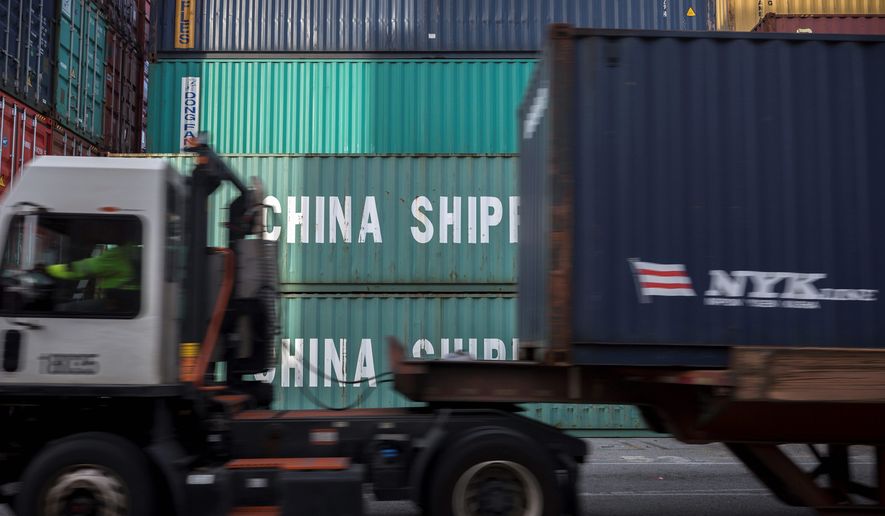The Trump administration is facing two major trade-related deadlines in the coming week, with decisions looming on imposing new tariffs for $156 billion in Chinese consumer goods, and allowing a key World Trade Organization appeals panel to expire.
Twenty-six free trade and industry organizations urged President Trump in a letter to support proposed reforms to the WTO before its appeals tribunal loses its ability on Tuesday to settle trade disputes.
“America’s economic interests will be harmed if there is no internationally agreed upon mechanism for combatting unfair trade practices of other nations,” the groups told Mr. Trump. “Now is the time to put forward a specific, detailed U.S. proposal aimed at reforming the dispute settlement system so that global trade rules can be predictably enforced. The WTO dispute settlement system is worth saving.”
The president has criticized the Geneva-based WTO for ruling against the U.S. too often. His administration has refused for two years to consider filling vacancies on the WTO’s Appellate Body, effectively vetoing new nominees as the seven-member panel has been reduced to three by expiring terms.
The terms of two of the remaining members expire Tuesday, after which time no new decisions could be issued in trade disputes among the WTO’s 118 countries.
About 70% of WTO rulings are reviewed by the Appellate Body, making it an important arbiter of international disputes. The U.S. has complained that the WTO routinely ignores its own rule about issuing decisions on trade fights within 90 days.
Many U.S. manufacturers are closely following the issue, hoping that the administration can work out a solution with the WTO.
“A rules-based system is important to us,” said Paul Nathanson, executive director of the Coalition of America Metal Manufacturers and Users. “The steel tariffs are hurting us a great deal. We’re often the victim when countries aren’t playing by the rules, including our own country.”
The president called on the WTO in July to end China’s status as a developing nation, arguing that it allows the world’s second-largest economy to receive preferential treatment in trade matters while exporting cheaper products that take away jobs from the U.S.
The president has shown his disdain for the WTO’s authority by taking trade matters consistently into his own hands, imposing tariffs in a series of battles with China, the European Union, Canada, South Korea and others on products ranging from steel to solar panels.
Among the decisions awaiting WTO adjudicators the U.S.-China tariff war, the steel and aluminum tariffs imposed by Mr. Trump since last year.
The U.S. and China are negotiating “around the clock,” but it is unclear if they will reach a phase-one trade deal this month or if talks will slip into the campaign year, Mr. Trump’s top economic adviser said Friday. New U.S. tariffs are set to go into effect Sunday on Chinese goods including toys, laptops and phones.
Larry Kudlow, director of the White House’s National Economic Council, said one thing is for certain: Mr. Trump’s priorities will not change if he must negotiate with Beijing while running for reelection.
“I don’t think his criteria or conditions change. He’s protecting America, he’s defending our economy, our manufacturers, farmers [and] technology people. He’s defending us from unfair trading practices,” Mr. Kudlow told White House reporters. “I don’t think that has anything to do with the election. I think what he is looking at is the long-term security of the United States and its economy and it’s working.”
Mr. Kudlow said the House impeachment drive won’t upset talks, either.
“Personally, I don’t think this impeachment stuff is going any place. There may be an impeachment vote. There will be no conviction, that is my view. I think the Chinese know that. I think a lot of people know that,” he said.
U.S.-China trade talks have been an up-and-down affair, with tit-for-tat tariffs rattling global markets.
The administration is trying to get China to buy more U.S. agricultural goods and drop objectionable trade practices, such as the massive subsidization of its industries and forced transfer of intellectual property from U.S. companies that do business there.
Both sides have agreed to pursue a “phase-one” deal that knocks out some demands, before pivoting to a fuller deal. But the initial pact is still being written.
Mr. Kudlow couldn’t say whether Mr. Trump will ease off the tariffs set to kick in, as talks proceed, though he acknowledged it is a decision the president must tackle.
“That is out there and it could happen if the deal is not completed by December 15,” he said.
Mr. Trump has been coy about how much he wants a deal. He’s eager for measures that will help key constituencies, such as farmers, though he recently said he doesn’t mind waiting until after 2020 to strike a deal. He says he will be in a stronger position if he is reelected.
“We are close. We’re not quite there yet. The president has characterized these talks as constructive and I don’t want to make any forecasts about any dates. There’s no arbitrary deadlines, there never has been,” Mr. Kudlow said.
The coalition of free-trade groups are urging Mr. Trump to support WTO consensus reform proposals known as the “Walker principles,” including a firm 90-day deadline for rulings; plus establishment of an oversight and audit committee and eight-year term limits for members of the Appellate Body.
The letter was signed by Americans for Prosperity, the American Soybean Association, Citizens Against Government Waste, the Coalition of American Metal Manufacturers and Users, the Competitive Enterprise Institute, FreedomWorks, the National Corn Growers Association, the National Retail Federation and others.
• Dave Boyer can be reached at dboyer@washingtontimes.com.
• Tom Howell Jr. can be reached at thowell@washingtontimes.com.




Please read our comment policy before commenting.